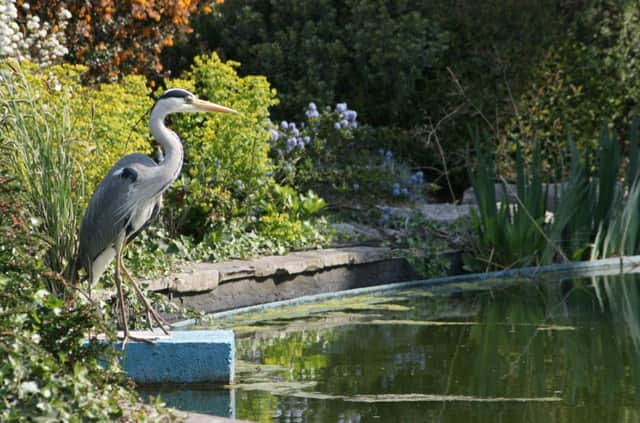BRIAN KIDD: The nuisance of a duckweed plague


Paul, from Denmead, and Chris from Fratton, wrote about problems with ponds and I recalled the same troubles.
We have been plagued with duckweed on the surface of the pond again this year.
Advertisement
Hide AdAdvertisement
Hide AdThis tiny green floating plant is a real nuisance and, if untreated, completely covers the surface making it impossible to see the fish.
During the winter we managed to clear the entire surface by lifting out sheets of ice. If just one little piece is left behind it breeds like mad.
In spring we were back where we started. Off to the garden centre to see if there was a product to do the job.
We used it according to the directions and waited with baited breath – it didn’t work. Back to the drawing board.
Advertisement
Hide AdAdvertisement
Hide AdWe now have a team effort on combating this problem. Pam uses the hose and squirts the jet of water over the surface of the water whilst I am at the opposite side, using a fine fishing net to scoop up the duckweed.
On previous occasions I have just used the net to scoop up the weed but using the hose ensures we remove far more duckweed in a shorter period of time;
I can’t understand why we haven’t done this before.
We had another problem aggravated by a hot spell in late June –blanket weed.
This nuisance grew so rapidly I was worried the pond water would overheat or the water would lack oxygen, so I used barley straw to control it.
Advertisement
Hide AdAdvertisement
Hide AdThe worst of the weed was removed using a rake. A lot of oxygenating plants were removed at the same time. We could now see the fish again.
Instead of using barley straw floating mats, we used a product which contains the bacteria found in the barely straw, Pond Clear.
It’s expensive so we bought the largest size as it may need another treatment.
It worked.
Quite a lot of blanket weed turned yellow and floated on top of the water and was again removed with a rake.
Advertisement
Hide AdAdvertisement
Hide AdThat which was clinging to the sides of the pond simply turned black and has now disappeared.
Now, I must be honest, we took the bull by the horns, got some professional help, replaced the pond liner and no longer have duck weed or blanket weed.
We have had regular visits by a heron which has the cheek to sit on top of the hedge overlooking the pond, eye up the fish and swoop down and gobble up the fish.
We were really angry and decided to buy a plastic heron because it is supposed to keep herons away.
Advertisement
Hide AdAdvertisement
Hide AdOurs didn’t. The heron came down and tried to mate the plastic one!
We bought an electric fence, the heron arrived, walked up the pond, got a shock and flew off.
A few days later, the heron arrived again and instead of walking across the grass to get a shock from the fence, he landed on a large area of water lilies to grab the fish.
The pond is now covered with wooden frames and wire mesh. It spoils the look of the pond but at least we don’t have to battle with the duckweed and blanket weed.
Tip of the week
Advertisement
Hide AdAdvertisement
Hide AdRemove single flowers on begonias which should have double flowers.
If we forget to do this even more single flowers will start to appear.
qUESTION TIME
Q. I was given a large pot of irises and they bloomed really well. Nothing came up this year so I decided to take the compost out of the pot. There were no signs of the iris
plants but there was a hen’s egg in the compost. The surface was not disturbed. My
friend tells me she didn’t put the egg there!
P. A.M, Portchester
Advertisement
Hide AdAdvertisement
Hide AdA. The iris bulbs were eaten by millipedes, this often happens to iris in pots. The egg was buried by a fox. They pick up eggs very gently and bury them to be eaten when food is difficult to find. Q. Can you tell me what is attacking the edges of my dahlia flowers?
M G, Hayling Island
A. This is due to earwigs at night. Put a flower pot on a short stick with a sheet of newspaper crumpled up inside and hide it in the foliage near the base of the plant. In the morning go out to a smooth pavement with the pot, open up the paper and the earwigs will fall out. Q. I am gardening with my little boy and he grew some carrots and they taste really
wonderful. The trouble is that there are little black lines in some of the roots but I can’t see why. My mum tells me that you will have the answer for me.
Liz, North End
A. I am delighted you are gardening with your little boy. This problem is due to a pest called carrot root fly.
Advertisement
Hide AdAdvertisement
Hide AdIt can be prevented if you cover the next sowing with insect barrier mesh supported by plastic water piping made into half circles. I have sent you a diagram. You will find the right mesh at Keydell.